
TUGE Healthcare has been making significant technological efforts to develop advanced endoscopic imaging systems. We have been making advancements in areas such as optical design, image processing algorithms, and system integration to provide doctors with a clear and accurate view during surgical procedures.
Our team of experts in optics, mechanics, electronics, and software engineering has been dedicated to overcoming significant technical challenges. We have invested in state-of-the-art optical systems and high-performance computing capabilities to optimize image processing and visualization. We also collaborate closely with leading experts in the medical field to stay abreast of the latest advancements and trends.
With TUGE's core technology - 5D™ platforms, we have been able to integrate the capabilities of optics, mechanics, electronics, software, and AI to bring innovative solutions to the healthcare industry. 5D™ platforms have assisted us in the development and optimization of a range of products and have laid a forward-looking foundation for research and development.
Core Technology
DeepImaging® Platform
TUGE’s imaging platform with multiple-patented technology, compatible with both video endoscopes and optical endoscopes, combines multiple types of CMOS and multispectral imaging, deploys 30+ ISP algorithm modules on high-speed FPGA, and supports full-chain 4K/ 8K image processing, 2D/3D image output, achieving the endoscopic imaging with the highest definition in the industry.
DeepColor® Platform
TUGE uses 3D LUT color mapping to enhance the richness and accuracy of imaging colors. At the same time, we have developed AI deep learning-based image enhancement technology to improve the level of detail and the layering of images in the endoscopic system. This technology enables us to efficiently process the captured images from light collection to transmission. Full-link precise color management restores real surgical scenes.
DeepLink® Platform
TUGE's patented Deeplink® Technology utilizes self-developed software and high-speed interconnection to facilitate smart-link control between multiple devices. Additionally, it enables intra-hospital live-streaming for demonstration and teaching purpose.
DeepVision® Platform
TUGE has made a series of innovations to optimize the visual performance of minimally invasive surgery. We explore and reserve technologies like MR , intraoperative navigation, and AI to advance in the field of restoring reality, augmented reality, and mixed reality.
DeepSync™ Platform
TUGE utilizes FPGA chips as a platform to process image signals at high speeds. While maintaining a high level of stability, the system achieves minimal delay with an ultra-high processing bandwidth of 100Gbps(Entire system latency<0.06 seconds). Hardware modules like the 12G-SDI interface and other high-end configurations enable efficient and low-power consumption for full-link signal transmission. At the same time, FPGA's high flexibility and scalability allow for quick iteration and customized development of platform functions.
DeepImaging® Platform
TUGE’s imaging platform with multiple-patented technology, compatible with both video endoscopes and optical endoscopes, combines multiple types of CMOS and multispectral imaging, deploys 30+ ISP algorithm modules on high-speed FPGA, and supports full-chain 4K/ 8K image processing, 2D/3D image output, achieving the endoscopic imaging with highest definition in the industry.
DeepColor® Platform
TUGE uses 3D LUT color mapping to enhance the richness and accuracy of imaging colors. At the same time, we have developed AI deep learning-based image enhancement technology to improve the level of detail and the layering of images in the endoscopic system. This technology enables us to efficiently process the captured images from light collection to transmission. Full-link precise color management restores real surgical scenes.
DeepLink® Platform
TUGE's patented Deeplink® Technology utilizes self-developed software and high-speed interconnection to facilitate smart-link control between multiple devices. Additionally, it enables live streaming both within and outside of the hospital.
DeepVision® Platform
TUGE has made a series of innovations to optimize the visual performance of minimally invasive surgery. We explore and reserve technologies like MR , intraoperative navigation, and AI to advance in the field of restoring reality, augmented reality, and mixed reality.
DeepSync™ Platform
TUGE utilizes FPGA chips as a platform to process image signals at high speeds. While maintaining a high level of stability, the system achieves minimal delay with an ultra-high processing bandwidth of 100Gbps(Entire system latency<0.06 seconds). Hardware modules like the 12G-SDI interface and other high-end configurations enable efficient and low-power consumption for full-link signal transmission. At the same time, FPGA's high flexibility and scalability allow for quick iteration and customized development of platform functions.
5 Key Advantages

SHARP
Clear, vivid images have the ability to restore immersive surgical scenes.

PRECISE
Precise color reproduction allows for enhanced differentiation of tissues, fascia, and blood vessels.

RAPID
High-speed data processing and low system latency ensure consistent hand-eye coordination for surgeons.

RELIABLE
Reliable performance under extreme electrosurgical interference.

SMART
Intelligent joint control improves surgical efficiency.
Core ISP Features


01
ACRe (Accurate Color Rendition)

02
Super Resolution (AI Inside)

03
Distortion Correction

04
WDR (Wide Dynamic Range)

05
Digital Desmoking

06
Vascular Enhancement

07
Electronic Staining

ACRe (Accurate Color Rendition)
The patented color restoration technology precisely calibrates each display device,achieving a color deviation index △E < 1.5 for ultra-high performance. This makes surgical images more accurate and layered, making it easier for surgeons to distinguish between tissues or boundaries.
Super Resolution (AI Inside)
This patented technology utilize deep learning acceleration al-gorithms and FPGA chips to improve the clarity of imaging by 2-3 times (angular resolution) for small aperture optical lens, making it easier for surgeons to distinguish blood vessels,nerves, and membranes.

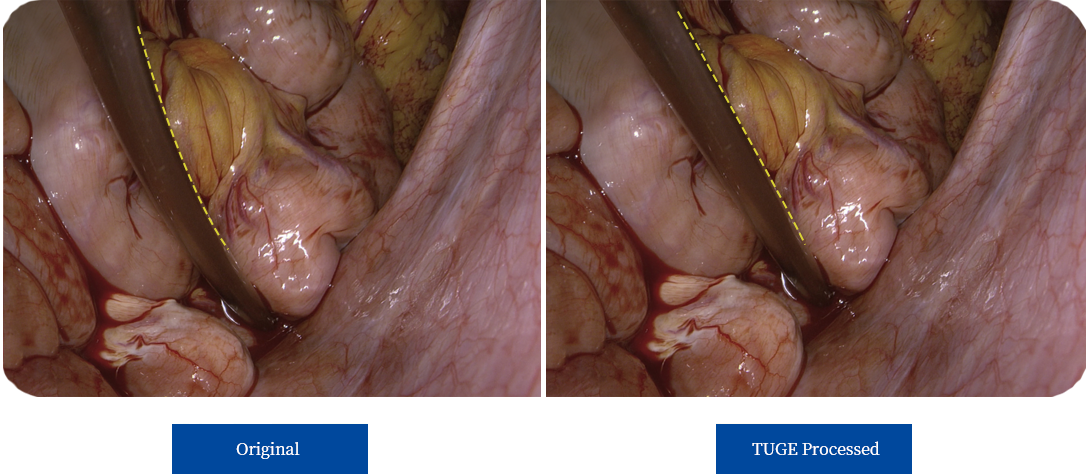
Distortion Correction
The 3D lens module utilizes a micron-level registration to ensure consistency between the left and right eyes. Additionally, a patented algorithm is employed to calibrate the images, resulting in an approximate distortion rate of 0.1%.
WDR (Wide Dynamic Range)
WDR technology can achieve dynamic management of surgical image brightness, by brightening the dark areas and suppressing overexposure, making the brightness of the surgical scene image moderate, allowing clear presentation of details both in distant and close-up views.
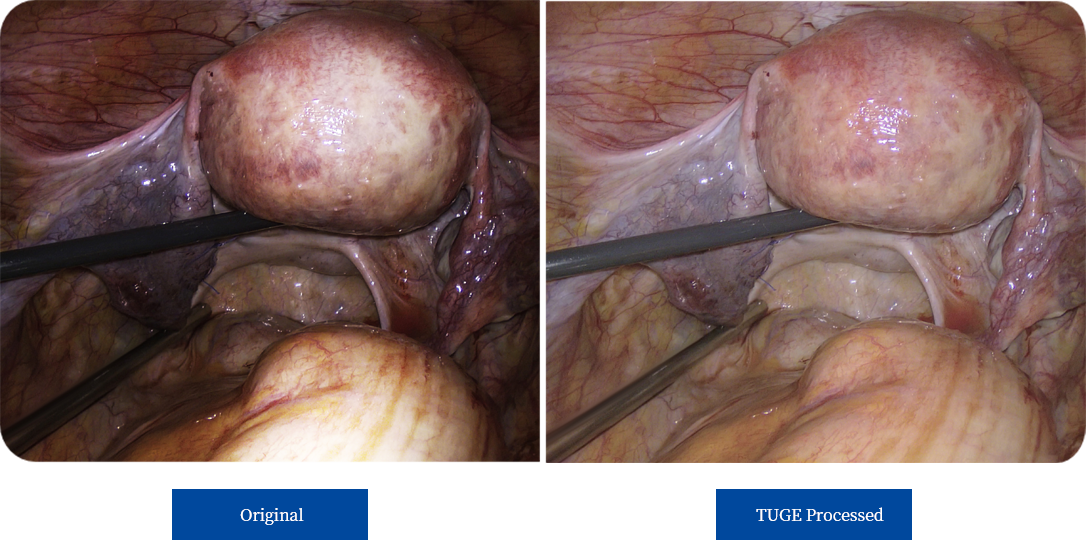
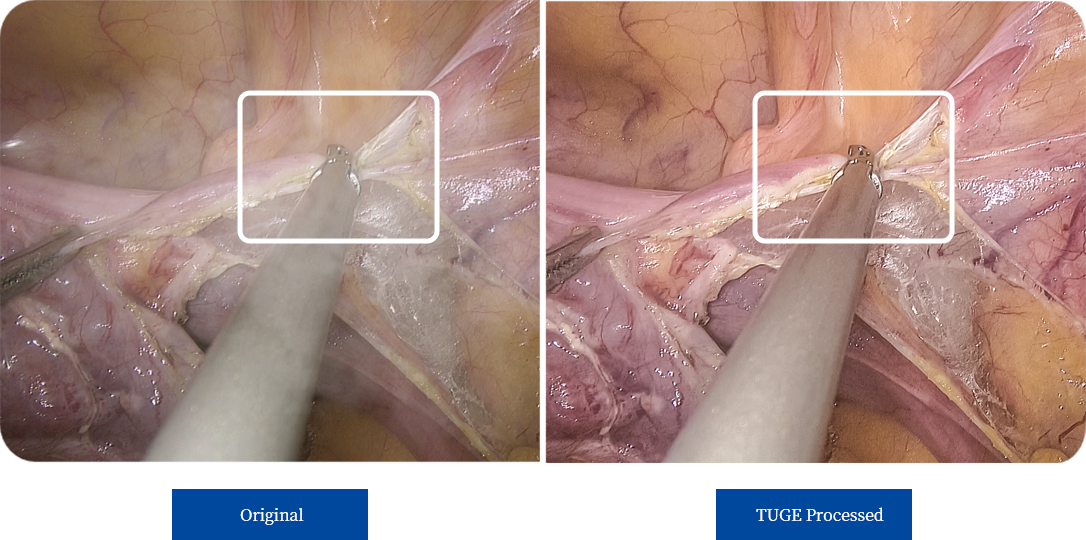
Digital Desmoking
Using deep learning to accelerate real-time dynamic recognition of smoke in images,accurately analyze and process smoke signals, helps to reduce interference during surgery and ensures accurate observation.
Vascular Enhancement
According to the absorption characteristics of blood vessels in the spectrum, TUGE uses self-developed algorithms to enhance the visibility of blood vessels, making it easier for surgeons to observe and perform precise surgical operations.
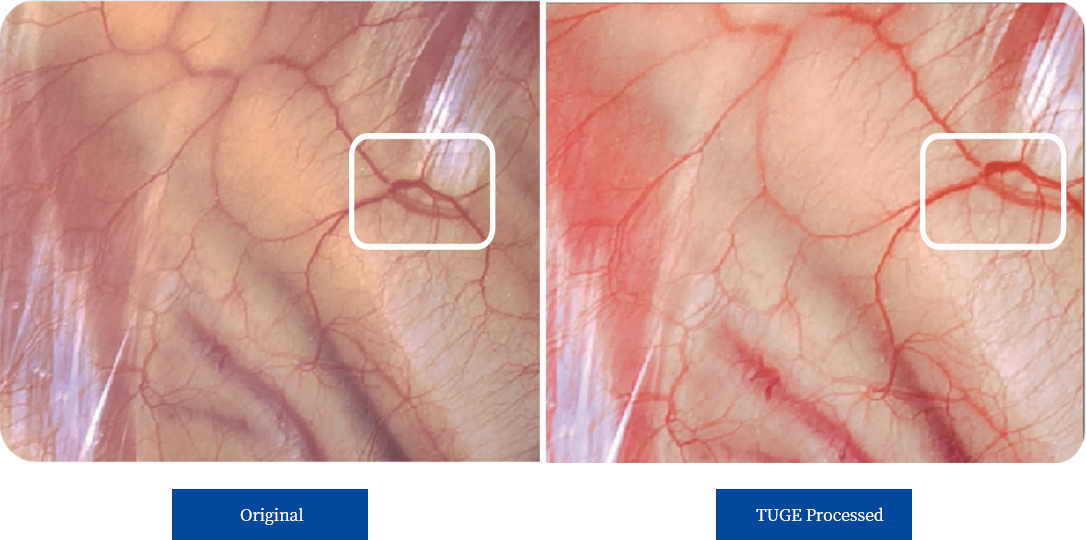
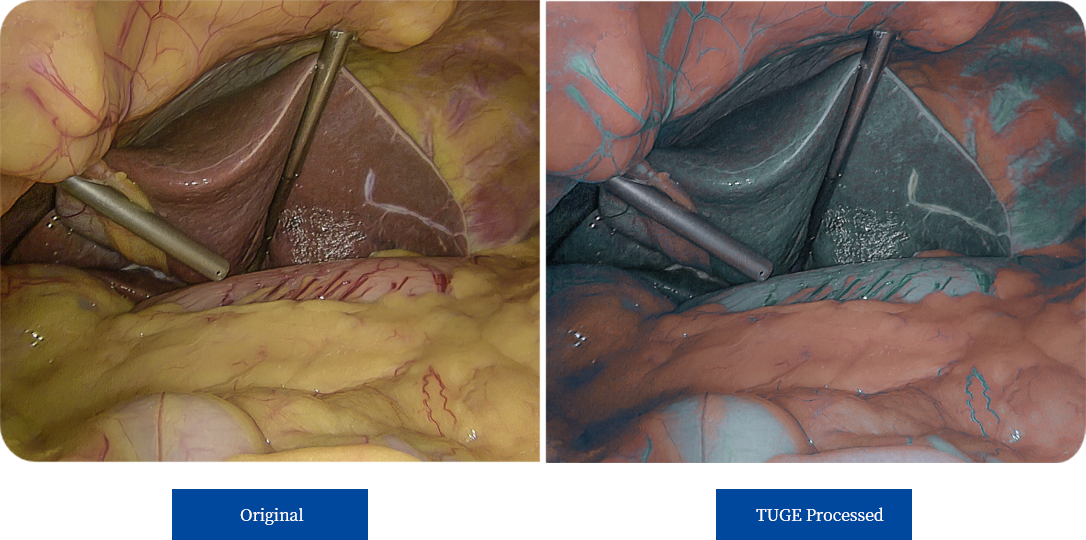
Electronic Staining
Using the principle of spectral fltering, tissue color differences are enhanced through electronic staining, making it easier to identify different tissues and assist in diagnosing the location of lesions.








